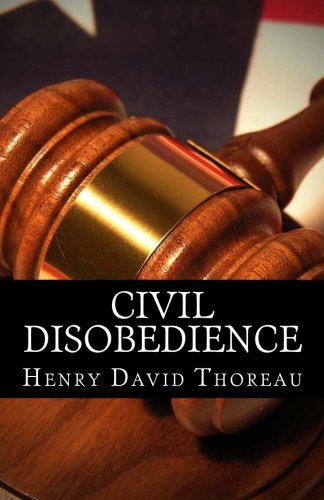Many Americans have been aghast at violent mobs toppling statues and the widespread looting and destructive rampages that followed the killing of George Floyd. Media coverage often ignores the damage inflicted by righteous rioters and the businessmen, black and white, whose livelihoods have been destroyed. Instead, activists are portrayed as heroic because of their political rhetoric and demands for radical changes.
Soaring political animosity is sparking fears of much greater conflicts in the coming months. More than 160 years ago, a similar pattern paved the way for a conflict that ravaged much of the nation. Few people are aware of how one of America’s most respected philosophers helped inflame the divisions that led to the first Civil War in 1861.
In his 1849 essay, “On the Duty Of Civil Disobedience,” Henry David Thoreau boldly declared: “That government is best which governs not at all.” After a night spent in jail for refusing to pay taxes, Thoreau “saw that the State was half-witted.” He concluded, “I quietly declare war with the State,” withdrawing his allegiance as long as the government enforced unjust laws.
 Attention Deficit Demo...
Best Price: $1.97
Buy New $9.91
(as of 01:45 UTC - Details)
But late in his life, Thoreau mutated into an apologist for bloodthirsty political fanaticism. Thoreau, following in the footsteps of his friend Ralph Waldo Emerson, believed that “our whole life is startlingly moral. There is never an instant’s truce between virtue and vice.” Thoreau was a Transcendentalist with boundless faith in absolute truth and absolute goodness. And he never doubted that he perceived those absolutes far more clearly than the vast majority of people who “lead lives of quiet desperation,” as he wrote in Walden.
Attention Deficit Demo...
Best Price: $1.97
Buy New $9.91
(as of 01:45 UTC - Details)
But late in his life, Thoreau mutated into an apologist for bloodthirsty political fanaticism. Thoreau, following in the footsteps of his friend Ralph Waldo Emerson, believed that “our whole life is startlingly moral. There is never an instant’s truce between virtue and vice.” Thoreau was a Transcendentalist with boundless faith in absolute truth and absolute goodness. And he never doubted that he perceived those absolutes far more clearly than the vast majority of people who “lead lives of quiet desperation,” as he wrote in Walden.
Thoreau was justifiably fiercely opposed to slavery. He had initially been wary of fire-breathing Abolitionists who wanted the nation to pay any price to end slavery until he met and swooned for John Brown in 1857. Thoreau donated to Brown after hearing him make a rabble-rousing speech. Thoreau bragged that he “never read” the political columns in newspapers because “I do not wish to blunt my sense of right.” Maybe that helped explain Thoreau’s obliviousness (or lack of concern) regarding Brown’s notorious murders in Pottawatomie, Kansas, when he and his sons hacked to death five men living in a pro-slavery portion of the state. That 1856 carnage embodied one of Brown’s favorite sayings: “Without the shedding of blood, there is no remission of sin.”
In October 1859, Brown led a band of zealots attacking Harper’s Ferry, Virginia to seize the federal arsenal, part of his plan to end slavery via the mass killing of slaveowners across the South. Mount Holyoke University professor Christopher Benfey aptly characterized Brown in the New York Review of Books in 2013 as someone who was “murderous, inept, politically marginal, probably insane.” Most of the nation was horrified by Brown’s attack at Harper’s Ferry, which was speedily put down by federal troops led by Lt. Colonel Robert E. Lee. Even the nation’s foremost abolitionist newspaper, The Liberator, condemned Brown’s attack as “a misguided, wild, and apparently insane–effort.” Horace Greeley wrote in the New York Tribune that “the way to universal emancipation lies not through insurrection, civil war, and bloodshed, but through peace, discussion, and quiet diffusion of sentiments of humanity and justice.”
 Crises of the Republic...
Best Price: $11.00
Buy New $13.58
(as of 03:21 UTC - Details)
Crises of the Republic...
Best Price: $11.00
Buy New $13.58
(as of 03:21 UTC - Details)
But Thoreau decided that Brown was literally Jesus—or at least that Jesus and John Brown were “two ends of a chain which I rejoice to know is not without its links.” In “A Plea for John Brown,” an oration delivered in Concord, Massachusetts two weeks after Brown’s attack, Thoreau referred to Brown as an “angel of light” and described Brown’s Harper’s Ferry accomplices as his “twelve disciples.” Thoreau hailed “the new saint who would make the gallows as glorious as the cross.”
Thoreau exalted Brown: “No man has appeared in America, as yet, who loved his fellow man so well, and treated him so tenderly.” That was balderdash on par with Stalin’s apologists gushing in the 1930s about the “peace-loving Soviet Union.” When Thoreau and Emerson met Brown in 1857, Brown told them that it would be “better for a whole generation of men, women, and children should pass away by violent death” than for the Golden Rule or Declaration of Independence to ever be violated. Rather than recognizing Brown as a lunatic seeking a pretext to slaughter much of humanity, Thoreau and Emerson hailed him as a moral visionary. But they never explained how to reconcile the Golden Rule with genocide.
 John Brown, Abolitioni...
Best Price: $14.11
Buy New $12.62
(as of 03:05 UTC - Details)
John Brown, Abolitioni...
Best Price: $14.11
Buy New $12.62
(as of 03:05 UTC - Details)
 Civil Disobedience
Buy New $3.99
(as of 03:05 UTC - Details)
Civil Disobedience
Buy New $3.99
(as of 03:05 UTC - Details)





